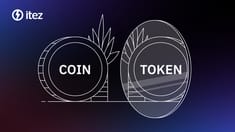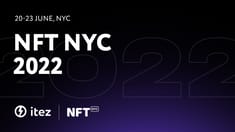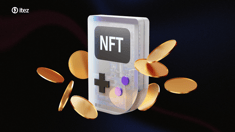During May 2023, Trezor and Ledger hardware crypto wallets were on a spike: the crypto community found Trezor hack instructions on YouTube, and Ledger was highly criticized because of its potentially non-secure new seed-phrase recovery function that scammers may use to access user’s accounts.
Is it necessary to pay attention to all crypto gossip, which kinds of crypto wallets are available on the market, and how to keep digital assets safe? Let’s figure out.
What is a crypto wallet
A cryptocurrency wallet is a physical device, program, or service that helps keep coins safe. It is an important element of the cryptosystem that you can’t buy crypto without because every coin needs a place to keep it.
A cryptocurrency storage can be compared with a classic banking app. Traditional financial services have total control over users' funds, which means they can freeze assets or deny transactions whenever they need it. Some crypto wallet developers have the same options, but there also are fully decentralized wallets that provide users with total control over their funds and transactions.
Hot and cold wallets
We can split all crypto wallets into two groups, depending on the coin keeping method: hot and cold.
🔥 Hot wallets have a constant connection to the web. It is a perfect option for someone who needs to conduct many crypto transactions per day: if you use coins as a payment tool in your daily life or as a trading instrument. Online connection increases vulnerability because it makes it easier for scammers to get to your funds. By the way, some wallets keeps your seed phrase, the access key, which is not safe.
Usually, hot wallets programs are free. Most often, they look the same as the standard traditional banks applications.
❄️️ Cold wallets don’t have a constant web connection. People use them for long-term money keeping. Offline mode makes it almost impossible for scammers to get the coins. It makes cold ones safer than hot analogues. But here is one issue: it is not convenient to use them on a daily basis. It is a centralized wallet.
Most hardware wallets are embodied as flash drives for data, like a memory stick. They're pretty expensive (it may cost you from a few tens to a couple of hundred dollars), but their security level is unreachable for hot ones. Even if you lose your physical wallet, it is always possible to recover funds.
💬 Choose hot wallets for everyday expenses and cold ones if you are into long-term savings. Transaction fees are going to be the same in both versions.
Wallets subtypes
All wallets can be split into groups depending on their technical features. The hot ones may be:
💱 Exchange wallets. A user can get one automatically after registration on a crypto exchange. Authentication are usually required.
📲 Mobile, desktop, and web — for mobile phone, computer, or web browser.
📓 Full node wallet and light one. The first one requires blockchain downloading, while the light one doesn't (in some cases, it may be necessary to download a part of a blockchain).
🪙 Mono and multi coin wallets. It all depends on the number of coins it supports.
🔐 Custodial and non-custodial. The first means that the wallet’s developer controls all funds. The second one means that only the user has control over their coins.
There are two types of cold wallets on the market:
Hardware. Means a physical gadget with a special OS. Common examples are Trezor and Ledger. Cryptocurrency support may vary. Wallet setup can be not easy for beginners.
Paper. Such aggregators give you an address and a unique access code. The user can write down the data or print it out. You can create one with bitaddress or other similar platforms.
How the paper wallet works: Step-by-step guide
1️⃣ A user buys crypto via itez.
2️⃣ Bitaddres provides them with an address to transfer coins and offers a private access key. Both address and key have two options: a set of symbols or a QR code.
3️⃣ Cold-paper crypto wallet generators are supposed to require user to keep all data printed, so platforms offer the option to choose the amount of copies.
4️⃣ Let’s imagine that the user kept their coins in a cold paper wallet for 5 years, and now they want to transfer assets. In order to get access to the funds, they are supposed to scan or enter a private key.
An example of bitaddres cold paper wallet.
Paper wallets have many disadvantages:
📝 A piece of paper with a password is easy to loss, and then it will not be possible to recover assets.
👀 No one can guarantee that the user's device was not observed by fraudsters through spyware during the address and key generation process.
🥸 There is no certainty that the platform that generates the address and code does not belong to scammers.
It is also not really convenient, so cold paper wallets for cryptocurrencies are rarely used.
A paper hardware wallet for cryptocurrency can be self-made: you can independently calculate the wallet address using a special algorithm in Excel offline without providing data to third parties.
The same is true with the cold hardware one: it can be self-made out of a device with internal memory, such as a mobile phone, computer, or even a flash drive.
In both cases, you need to understand programming and learn more about possible risks. One small mistake can cost all the coins.
☝️ If you trade cryptocurrencies or use them regularly, a non-custodial hot wallet is the best option. If not, a hardware cold one is your choice.
Best Cold wallets
The most secure way to store coins is a cold hardware wallet. There are two most popular developers of such devices on the market: Trezor and Ledger.
Trezor
Trezor is a Czech project owned by SatoshiLabs, named after Bitcoin's creator pseudonym. It was founded in 2013 by businessman Marek Palatinus.
In May 2023, Trezor was at the center of a scandal. A video appeared on YouTube with instructions for hacking one of the wallets. Trezor acknowledged the vulnerability but noted that in order to gain access to assets, a fraudster would need to gain physical access to the device.
At the time of writing, Trezor offers two cold popular wallet models with wallet backup functions. Wallet recovery can be done using new device.
Trezor Model T ($219). A cold wallet with a touchscreen supports more than 1000 cryptocurrencies. It is managed for storage, buy, sell, and exchange of coins through the Trezor Suite program, which can be installed on a computer, downloaded on a mobile phone, or opened in a web version. The device connects to the computer via a USB-C cable, providing secure wallet setup and cryptocurrency protection.
Model One ($69). This is a cold button wallet, also supports 1000+ cryptocurrencies and is managed through the Trezor Suite software. The device connects to the computer via a USB-A.
Ledger
Ledger is a French company. It was founded in 2014 by a group of security experts. The company has several times found itself on the brink of scandal.
In July 2020, Ledger user records leaked. In May 2023, the company was blamed because of its new seed-phrase recovery tool. Users were confused by the offer to upload phrases that users can enter to regain access to the wallet to several corporate servers. The developer postponed the scandalous update to reduce pressure.
At the time of writing, Ledger released two models of cold wallets.
Nano Nano X ($149). The cold wallet supports 5500+ coins and non-fungible tokens (NFTs). It connects to a computer via a USB-C and supports Bluetooth data transfer. You can manage assets, buy, sell, and exchange cryptocurrency through the Ledger Live app for desktop and mobile.
Nano S PLUS ($79). The wallet also supports over 5500+ cryptocurrencies and NFTs, even though many people consider it as single-coin, Bitcoin wallet. The Nano S PLUS does not have a Bluetooth module. You can also manage your wallet and buy, sell, and exchange cryptocurrency through the Ledger Live app, but the mobile version is only available on Android. It is a good choice for someone who is looking for anonymity and confidentiality.
KeepKey is another well-known cold wallets, even though it is less popular cold storage.
Best hot non-custodial wallets for crypto
Non-custodial wallets are a response to the requests of market participants who want to take full control over their cryptocurrency and have tools at their disposal to quickly conduct transactions. A fraudster can hack storage (if there are no vulnerabilities in its code) only if he gets an access key that the user receives during registration.
However, the crypto industry saw some cases of decentralized, non-custodial wallets being hacked. A striking example is the Atomic Wallet. At the beginning of June 2023, scammers gained access to the assets of wallet users worth $35 million. Presumably, the security breach occurred due to vulnerabilities in the storage code, which became known in 2021. Despite the warnings, the developers did not take action to fix the problems.
Therefore, when choosing a non-custodial hot wallet, it is worth remembering all the risks.
Ever Surf
Ever Surf is a hot non-custodial wallet. It is available in app, desktop, and browser versions. You can store cryptocurrencies and NFTs and earn on staking (intentional cryptocurrency retention to maintain the network for a fee). The program supports 20 cryptocurrency assets, including Cardano, Tether, and USD Coin. Developers made a bet on cryptocurrency compatibility.
The digital wallet was founded by the Everscale project. Ever Surf provides you with some Everscale coins (0.02 EVER) after registration. Here is the instruction.
ZenGo
ZenGo is one of the most respectable non-custodial hot wallets developed for providing on-chain transactions. It was founded in 2018. Since then, its audience has grown, and developers have integrated new features into the program.
In ZenGo, you can store, buy, sell, and exchange 70+ cryptocurrencies, including popular altcoins and DeFi-project coins. You can consider it as NFT storage as well. The wallet has become a convenient guide to the world of decentralized applications, accessing average users to them.
ZenGo developers claim that they managed to create the most secure protection for users' digital assets.
Trust Wallet
Trust Wallet is a non-custodial hot wallet under the control of the largest cryptocurrency exchange, Binance. You can use it to store, buy, sell, and exchange the most popular cryptocurrencies and NFTs, as well as earn on staking.
In frequently asked questions section on website the developers claim that Trust Wallet supports 70 blockchains and 9 million assets. Perfect for managing cryptocurrency, if you are not concentrated on one coin. It can be used as Ethereum wallet, or storage for any another coin.
So, what to pick?
The safest way to store cryptocurrency is a cold hardware wallet. There are two popular manufacturers on the market: Trezor and Ledger. Both companies recently experienced a spike in scandals. The Ledger hack has not been proven, but the Trezor security is questionable.
Ledger, with its Nano S PLUS and Nano X models, has become the leader of our guide. The gadgets are pretty similar. Nano S PLUS is cheaper, while Nano X has a Bluetooth module and provides the ability to be controlled from iOS devices.
If you want to use cryptocurrency on a daily basis, non-custodial hot wallets are suitable. The best choice is Trust Wallet.
To make accessing the crypto world even easier, we have prepared instructions for you to create wallets for the most popular coins: Bitcoin, Ethereum, USDT, TRON, MATIC, BNB, BUSD, and TON.
🤔 Which wallet do you prefer? Tell us in our socials!
💌 Telegram, Twitter, Instagram, Facebook
This article is not an investment recommendation. The financial transactions mentioned in the article are not a guide to action. Itez is not responsible for possible risks. The user should independently conduct an analysis on the basis of which it will be possible to draw conclusions and make decisions about making any operations with cryptocurrency.








